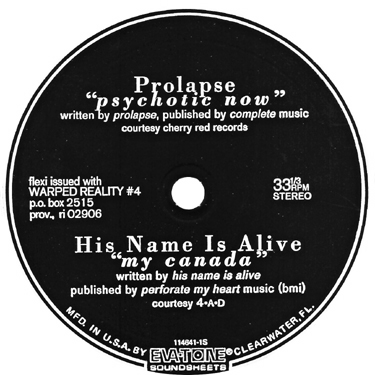
His Name Is Alive has a new album out. It’s called Detrola. We’ll have more about that later. To start things off, we have an interview with His Name Is Alive’s songwriter, Warren Defever, circa Mouth by Mouth, from the first ever issue of Warped Reality.
Delirium as a form of higher expression
Interview by Andrea Feldman & Jennifer Ferraro ¶ Warped Reality #1, Spring 1993
 In the middle of my freshman year at Parsons School of Design, I decided to start a zine. I don’t know what possessed me —I was working towards a dual degree, it was my first time living in New York City, and I had zero free time. Maybe it was the lack of sleep clouding my judgment. Anyway, I was just starting to get seriously into 4AD and His Name Is Alive was my favorite band. But I also knew next to nothing about them.
In the middle of my freshman year at Parsons School of Design, I decided to start a zine. I don’t know what possessed me —I was working towards a dual degree, it was my first time living in New York City, and I had zero free time. Maybe it was the lack of sleep clouding my judgment. Anyway, I was just starting to get seriously into 4AD and His Name Is Alive was my favorite band. But I also knew next to nothing about them.
(Ah, those halcyon pre-internet days…) So I did what any extremely naïve 4AD geek would do under the circumstances: I called Ivo Watts-Russell in an attempt to get an interview with the band. (Obviously I didn’t know anything about proper press channels. Ah well, live, learn.)
Somehow, my unorthodox methods worked in my favor. Ivo actually called me back. We had a lovely chat and he informed me that not only were His Name Is Alive due to perform in a month as part of their first East Coast tour, but he would be there as well. So I got to interview Warren Defever and meet Ivo all on the same day.
Not bad for a complete 4AD neophyte.
I’m presenting the interview with Warren here in its entirety. As tempting as it was to rewrite the intro to this, I’m reprinting it as is. —Andrea
***
When I first heard His name Is Alive, I was simply amazed. I have no qualms about saying that the music by this Livonia, Michigan-based group is some of the more beautiful, original, inspiring, and often disturbing music I’ve ever heard.
I also knew absolutely nothing about them. So when they recently played a one-off show at the Pyramid Club in New York City, I leapt at the chance to interview this rather mysterious group.
I almost didn’t make it. The night of the show, the weather was so awful that I thought it was a sure sign of the apocalypse. There was hail, freezing winds, and icy, driving rain. To top it all off, Jen and I had to try and hail a cab in this hellish miasma —and there weren’t any to be found! (In New York, a second sign of the apocalypse!) Society dames with fur coats and small, shivering dogs had already snapped them all up. Finally, just as we were about to perish from exposure, we flagged one down. Crisis averted.
By the time we got to the club, there was no sign of the band! Sound-check hadn’t even started yet. Jen and I got a little worried. Finally, HNIA’s guitarist and leader Warren Defever showed up. We went across the street to a bar where we a (relatively) quiet spot to conduct this interview.
AF: How did you come up with the name of the band?
WD: [laughs] That’s just a great question to start with!
AF: You’re probably really sick of that question, but…
WD: No, no. In the past, I’ve always told people that, you know, it didn’t start off as a band that was going to be the big promotion —we had no plan of doing interviews. We were [just going to] put out records. There are a lot of personal things —things that meant something to me— that I never thought I’d have to explain. And that’s what I would tell people about the name and then they wouldn’t ask any more about it.
But the fact of the matter is —I was in high school and when I was in high school I had a little problem with sugar. Well, I would pass out a lot because I’d eat ice cream for breakfast and stuff. One of the things I wrote during one of these blackouts was the phrase “His name is alive.” It was a reference to Abraham Lincoln. There were other references that popped up that I thought were funny, but it doesn’t mean very much at all.
AF: When I first heard of the band, I thought [the name] His Name Is Alive had some kind of religious connotation. There seems to be an ecstatic feel to the band’s work…
WD: I think it fits. This new record [Mouth by Mouth] has more specific spiritual ideas, maybe moreso than the other two. Livonia [HNIA’s first album], the majority of it was written back when I was in high school, so I don’t really feel responsible. I was young, I was foolish …so I can’t say too much about that album. Home Is In Your Head [the second album] is a good album, and it says certain things about certain subjects and that’s interesting, but the new album is where we really put it together.
JF: Were you in any other bands, or was this your first project?
WD: There was a band that I played in for a long time called Elvis Hitler. I just played bass, I didn’t write any of the songs…
AF: Obviously!
WD: But it was a lot of fun. The best part about it was playing really lous and really fast. I got a lot of experience from it in dealing with the music industry and knowing what I wanted to do and didn’t want to do.
AF: What kind of music do you listen to?
WD: Oh, I don’t know…
JF: If you name one band, people think that sums up your—
AF: —you get pigeon-holed.
WD: What I think is important is that there are a lot of elements in His Name Is Alive —a lot of different, diverse parts, and that comes from listening to a wide range of things and stealing from them blatantly.
AF: Do you want to talk about the new album? [Mouth by Mouth] How come you re-made “The Dirt Eaters” [a song from Home Is In Your Head]?
WD: I’m in a band right now called the Dirt Eaters —with Melissa Elliott and Karen Neal, who sing some of the songs. Melissa wrote all your favorite songs on Home Is In Your Head, and she wrote the song “The Dirt Eaters.” And those songs are more full, less minimal, more drums, more bass. What we’ve done in the past is combine the two, but in the future they’ll be separate.
AF: There will be two releases?
WD:Right. But I don’t have as much to do with the Dirt Eaters, I’m just the lead guitar player. [laughs]
AF: You have your own studio, right?
WD: Technically, we have our own studio. It’s more like, just a bunch of equipment in a basement.
AF: Well, you can call it your own studio, c’mon!
WD:It is NOT a studio! I’ve seen studios, and this is not one!
AF: You create music there!
WD: Yeah, it’s cool. It’s really convenient. One of the reasons we’ve done it the way we have is that we have infinite studio time. There is no worry about anything. We just do what we feel like.
AF: That’s almost better sometimes. When you try too hard —when you just try to do something and it doesn’t come out, you just get blocked.
WD: Right, right. We’re at the point now where we’re ready to try a little bit. [laughs] Just to help us focus.
AF: I was surprised to hear that you were from America. I guess because, you know, 4AD’s British, but also because you don’t seem to have an American rock sensibility.

Failed attempt by Karin to take over the band, 1993.
WD: Well, we’re trying now. We’re trying to incorporate that. The American influence is coming through more now in terms of older American music, like country music.
When I was a kid, my grandpa would teach us kids how to play. I’d play banjo and he’d play his guitar or fiddle. We’d play country music and waltzes and square dances. At the time, I thought I was rebelling by playing rockabilly! I thought, “You know, that stuff is for the old folks! This is what us kids really dig!”
I was clueless.
[The music] has always been there, but I never figured out how to incorporate it at all. But now I’m getting closer with that, and different American musical forms, like spirituals or hymns. It’s purely American.
Part of what we do is really repetitive, really organized. What we’ve done now is incorporate more freedom, more open space, and more physical improvising. Which we’ve never done before. There’s more ethnic parts on this new record, there’s more sampling, there’s actually more lyrics than on the other albums.
JF: How about videos? You’ve made two?
WD: We’ve done them with two animators from England called the Brothers Quay. They’re crazy, they’re absolutely crazy.
AF: How did you get hooked up with them?
WD: They get these tapes from bands every day. In England, they’re really famous. And over here, they make little spots for MTV and everybody goes, “Oh, those are so great, they should make a whole video.”
AF: They’ve done little movies too.
WD: Films. Long, major works of art that are great. They’d never done a full-length “rock n’ roll” video before. A long time ago they did a ten-second section of Peter Gabriel’s “Sledgehammer” video.
Anyway, when Vaughan Oliver [head of v23, 4AD’s design firm] was in college, the Brothers Quay were teaching. He didn’t get to know them at all, but he loved their stuff, and he’d always wanted to set them up with a band. But there was never really a band that was appropriate for what they did. Then when The Dirt Eaters EP came out, Vaughan said, “Why don’t we contact them about making a video?” So we went over there, and they said, “We’ve never really done a video before. We don’t even like The idea of dong a video, but we’ll listen to it.” And they called us back and said, “This is really good. We’d like to do it.”
They’ve done a new one for us called, “Can’t Go Wrong Without You,” from the new album.
AF: For 120 Minutes airplay, huh? [laughs]
WD: Yeah!
AF: How did you guys get together?
WD: The band is just me and my friends. Just people I know. It’s pretty close-knit and tight.
AF: How did you all meet?
WD: Picture your friends. Now picture if they all played instruments. [laughs]
Different people play on different songs. Right now, I’m more interested in drummers and singers. On the new album, there are two drummers [Trey Many and Damian Lang], and four singers.
JF: You said you started this band in high school?
WD:Yes. The very first performance of His Name Is Alive was in 1986. It was at a try-out for Battle of the Bands. I sang and played guitar, and there was a string quartet. We didn’t make it.
AF: You self-released some cassettes before you hooked up with 4AD, right?
AF: Right. The first cassette was called [garbled]
AF: What was it called?
WD: Doesn’t matter. The second tape was called I Had Sex with God. That was the one Ivo [Watts-Russell, the head of 4AD Records] heard.
AF: Has any of this stuff appeared on albums? Have you compiled it, or is it gone forever, never to be heard again?
WD: Most of it ended up on Livonia. There are two songs on Home Is In Your Head that are older than ay of the songs on Livonia. But I’m not saying which ones!
JF: Do you always have stuff to write about? Do you ever get dry and can’t think of anything?
WD: I don’t write anything. The majority of the lyrics are jus quotes from people strung together randomly. No, that’s not true1 I don’t really think about what I’m writing, so I‘m not sure that it comes from experiences on a literal level. So, I don’t run out because I’m pulling stuff out that I didn’t know was there anyway. But there’s plenty of quotes!
There’s a song on the new album that has the phrase “Mouth to mouth” on it, right? We were thinking of that as the name of the album. But it just wasn’t satisfying enough. So then we came up with “Mouth by Mouthwest” which we thought was really funny, right, but kinda dumb. Then we came up with “North, East, Wes, and Mouth” which wasn’t even funny. It was just no good at all. Then we got it: “Earth to Mouth: Come In, Mouth.” Then we saw it on paper and the phrase “come in mouth” just did not look right. Scratch that. Eventually we ended up with “Mouth by Mouth” which looked good next to the other titles.
AF: Another question floated through my head, but—
WD: It’s gone!
AF: I think we’ve exhausted our questions, and possibly yourself!
His Name Is Alive’s third album, Mouth by Mouth, was released domestically by 4AD on April 13th. The band will launch its first national tour in support of the album in May and June.
Live, their sound is very stripped-down, consisting of Warren on guitar, Trey on drums, and Karin on vocals. But it is extremely powerful nonetheless. Plus, Warren will tell little stories about the cornfields back home in Livonia, Michigan.
POST_SCRIPT
There is some mystery regarding the His Name is Alive song “King of Sweet.” The title is listed (albeit upside-down) in the Mouth by Mouth CD booklet, and the March issue of Ray Gun featured a Vaughan Oliver/Colin Gray piece ostensibly illustrating the HNIA song, “King of Sweet.” Yet there’s no “King of Sweet” to be found anywhere.
Or is there?
In a recent phone conversation, Warren explained: “There’s this Japanese noise band who just released a box set called ‘King of Noise.’ And you know how Godzilla is the ‘King of Monsters’, right? Well, Vaughan (Oliver) suggested that we [HNIA] be ‘King of Sweet,’ and that I write a song around that idea. I didn’t come up with anything that was worthwhile, but we decided to use the name anyway.”
So it’s all a myth?
“Yeah. But there’s a limited edition CD of unreleased His Name Is Alive stuff coming out in June that will be called ‘King of Sweet.’”
Well, that’s one cryptic 4AD mystery solved. I forgot to ask Warren about the “Inner bag/Quality” seal featured prominently in both the Ray Gun artwork and that of the import vinyl of Mouth by Mouth.
In other HNIA news, the video for Can’t Go Wrong Without You, directed by the Brothers Quay, was finally (finally!) shown on 120 Minutes. Host Lewis Largent (who makes me pine for the days of Kevin Seal —and that’s saying something) called them “a wacky band from Michigan” and played the video dead last.
It’s sad (but predictable) that 120 Minutes plays two hours of benumbing grunge and “arty” videos only to relegate a work of art to the dead zone of 1:58 in the morning. Typical. I don’t suppose they’ll ever play it again.
His Name Is Alive has begun their first national tour, co-headlining with Swell. They’ll be playing TT the Bear’s in Cambridge MA on June 15th. You missed it.
***
You can watch the video for “Can’t Go Wrong Without You” thanks to the wonders of YouTube here. ¶King Of Sweet, released in very limited quantities by Perdition Plastics, has been remastered and re-released. You can order it through the official His Name Is Alive site. Just click on “Sounds.”
Here’s a track off the import-only version of Mouth by Mouth (which includes samples left off the US version!):
 His Name Is Alive, “The Homesick Waltz” [right-click-save-as, s’il vous plaît]
His Name Is Alive, “The Homesick Waltz” [right-click-save-as, s’il vous plaît]
 Remember print zines? How charmingly quaint they seem, now…
Remember print zines? How charmingly quaint they seem, now…![]() • His Name Is Alive, “My Canada”” [right-click-save-as, s’il vous plaît]
• His Name Is Alive, “My Canada”” [right-click-save-as, s’il vous plaît]






